More than ever before is the question of where gaming is headed in the future. It’s a topic of serious debate. Some believe that the gaming industry is on its way down the drain and that eventually there won’t be any new big budget games made. Others believe that things are fine and that they will continue on their current path for many more generations. There are also those that think gaming is here to stay, but that the way we game will change significantly very soon. While I have a number of opinions about gaming from the software side and how it seems to be developing and where it’s heading, I thought it was important to take some time and have a discussion about hardware in the gaming industry and where that’s headed.
Are things changing or staying the same for the foreseeable future? And what is it that we as gamers should really be hoping for in an ever changing and expensive market? My goal for this piece is not to give you answers, but to give you topics of discussion and some food for thought.

PCs and consoles have been at odds with each other probably since the PS1 era. It’s ridiculous to go as far back as the NES days because at that point console gaming was really just starting to become a legitimate business and even PC gaming was very simple and done by the equivalent of mostly hardcore gamers today. But by the PS1 days, both PCs and consoles were established mediums of gaming, and people had really started to commit to one or the other. Consoles have always held more sway over the general population because of better marketing and their user-friendly design. But at the same time, PCs have always had more freedom and versatility for gamers that want to take the time to commit to learning how to take advantage of this fact.
It must also be addressed that exclusives were a big factor at this time as well. In a gaming vacuum where time does not matter, PCs have better options because any game that can run on console does eventually make its way to PC either as an official port or as a ROM, but because gaming is very much a time based market, for many people consoles held better exclusives at the time of release. That’s a very subjective claim depending on what type of gaming you’re into. If we are talking about MMOs, then PC is king no questions asked. It’s only in recent generations with improvements in bandwidth and accessibility that consoles are even starting to really get with the MMO thing. Examples include games like the recently released Elder Scrolls Online and Final Fantasy IV: A Realm Reborn.
There are older examples going all the way back to Sega Dreamcast with Phantasy Star Online, but these titles are rare and widespread. PC MMOs come a dime a dozen. So for the purposes of argument we will not focus on those types of games or the gamers that play them. We will focus specifically on campaign-driven genres that commonly appear on both consoles and PCs. By the numbers, consoles are the preferred means of playing these types of games, but the reasons for that are very specific and obvious.
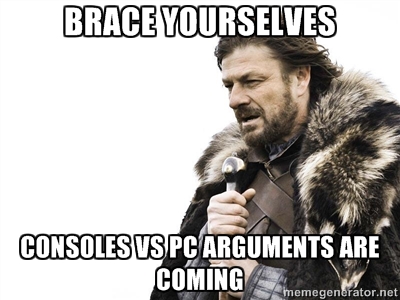
Top 5 Reasons why Gaming is more popular on Console than on PC
1. PCs have higher start-up costs.
It is arguable that in the long run PCs are cheaper. PC games usually drop in price much faster (thank you Steam sales), and while on console digital copies cost the same or sometimes more than physical discs, the same is not usually true for PC versions of games. PCs are by nature upgradeable so they don’t have to be replaced whenever Sony, Nintendo, or Microsoft decide to release a new console. You can simply buy new parts whenever you choose (not true for laptops though). While it’s not legal and in no way condoned by ManaPool, pirating PC games is much easier than console games.
But the startup costs for PC gaming are still much higher than consoles. If today I decided that I wanted to play Titanfall, I have 2 choices. Let’s assume for the purposes of argument that I have no current gaming equipment or a computer. I could go buy an XBOX One for $499 and buy the game for $59.99 or less. Let’s just ignore the fact there’s currently a Titanfall XBOX One bundle being offered.
My second choice would be to go buy a PC. Let’s assume that I refuse to buy used things so I have to either buy a brand new gaming quality PC (or laptop) or buy all the new parts necessary to build my own PC from scratch. While I could go into the specific details and parts, it’s safe to say that it will cost more than $560. Even if I just wanted the cheapest Alienware currently on the market, I would still have to pay $699 with no additions or upgrades. In today’s economy, startup cost is much more important to the average consumer, and because of this, most casuals, beginners, and many other types of gamers go for consoles.
2. PCs have a longer start-up time.
One of the things that people really love about consoles is their user-friendly quality. While PCs may run better and last longer, they require a lot more time to set up and learn how to use before I can actually play Titanfall. I would need to first get the PC physically set up which requires many more parts, cables, and time then that XBOX One, which comes as a single box with a cable for display, internet, power, and controller. It’s no more difficult than hooking up a VCR plus the internet connection.
After I’ve finally set up the PC, I still have figure out how to use it, set up all my preferences, and install lots of software and an OS. While there is a decent amount of set up time for consoles as well (even more with modern consoles), the startup time is still much lower and much easier to deal with than on a PC. I wouldn’t have to install Origin and set up an account only to then have to install Titanfall and set up those preferences too. Once the console is set up you can just put the disc in and it auto-updates. Then you just have to change any of the default preferences that you don’t like, which for most people isn’t necessary. Today’s very lazy and impatient majority will almost always choose faster over better and thus they go for the console.
3. Consoles require less space to use.
This is self-explanatory. Assuming I don’t have a gaming laptop, but actually went for the legit, PC Master Race desktop, I will at the very least need a desk or area to house the tower plus the keyboard, mouse, and monitor(s) (in case you’re really legit). Not to mention all the wires I have to run. And if I like to hook my PC to my big screen TV, then I need space and wires for that too.
Consoles on the other hand are very small by comparison. Even that big clunky XBOX original can be housed easily under a TV stand. If space is a big issue for you, which it often is for a lot of people, then you almost have to go for consoles over PCs or settle for the laptop, and any hardcore PC gamer will tell you that the laptop is settling.
4. Consoles require less knowledge to use in general.
As previously stated, consoles are easy to set up and start using. PCs require a lot more knowledge to use in general, especially if you have special preferences and settings. But they also require a lot more knowledge to repair and troubleshoot. When a PC goes down, there are a lot of common issues, but it could technically be anything from a user error to a damaged component. When a console goes down, it’s almost always a damaged component, and it’s very easy to figure out what it is. Getting them repaired can be more costly than PCs in many cases, but it’s also a much easier process. I really don’t see me fixing that Alienware with a hairdryer (Actually did temporarily fix a PS3 with that method twice).
5. Consoles have more exclusive big name titles.
A big part of this is because Microsoft gets a piece of most PC gaming and all Xbox profits, because they have the most popular OS currently on the market. The same is not true for Nintendo or Sony. Because of this, those 2 companies often release exclusive titles in order to get PC gamers to have to do some console gaming.
And let us not forget when things like GTAV happen. There was a time when big name PC exclusives used to sway console gamers, but this rarely happens outside of MMOs anymore. There are definitely some examples such as Portal, which has since then been ported, and Team Fortress 2, but for the most part popular exclusives fall more to the console side nowadays than the PC side within the genres we are talking about.
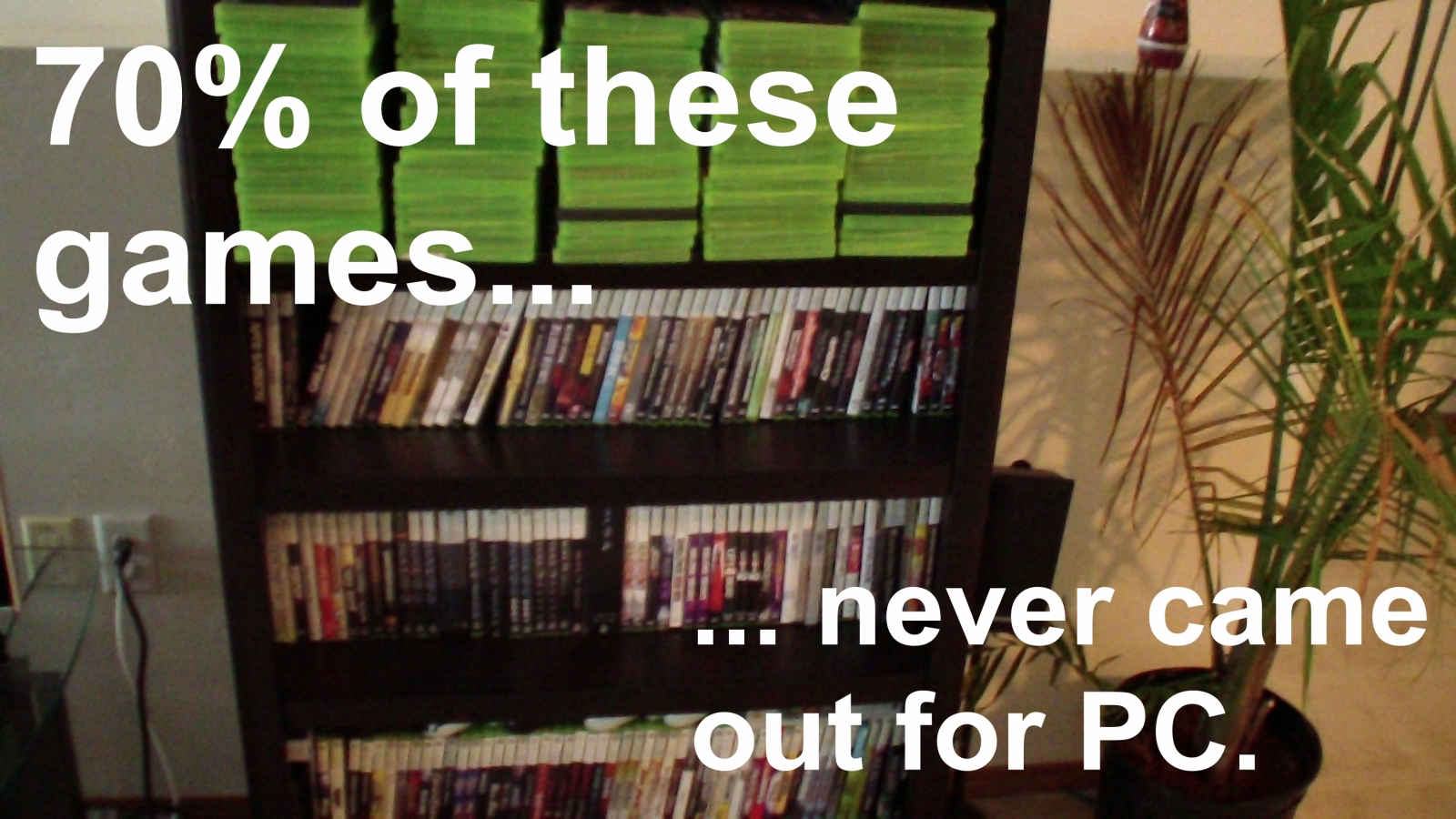
There are other reasons, but these are the big hitters for why console gaming is more successful than PC gaming to the general population. But you will notice that none of these reasons have anything to do with the actually quality of gaming except for number 5. It’s common knowledge that while consoles are easier to use and faster to set up, PCs almost always have better actual gaming.
The display is better, the versatility of gameplay experience and customization is bigger, the community is definitely more connected and active, and we’ve already said that in the long run the costs are lower once you’ve gotten set up. And because of ROMS, ports, and the general nature of PCs, considering that all consoles are basically limited computers, you have a lot more gaming options on PC as you eventually get access to all games such as retro classics that you could never buy physical copies of in stores anymore. Not to mention the fact that your PC is also a computer so it can actually do all the other things that you need your computer for such as video editing, internet surfing, content posting, writing, and so on.
While the differences between PC and console gaming have caused a divide in the gaming population as a whole, a closer look will show you that the 2 groups are slowly converging towards each other. When I was a kid in the 1990’s and even into the 2000’s, PC gaming was far removed from console gaming, as were the 2 groups of gamers. I personally grew up as a console gamer and I still am one most of the time, but in recent months I’ve been slowly moving towards PC.
One of my biggest complaints about PC gaming is/was the controls. I really hate using a keyboard to game. I know that a mouse and keyboard are more precise and thereby superior for FPS, but that’s actually my least favorite genre so it’s not really an issue for me. I don’t like having to search a keyboard for specific buttons just to change weapons and such. Gamepads are so much easier, and for a long time good gamepads only existed for use with consoles. There were definitely controllers for PC, but we all need to admit that they were pretty weird. I’m not always playing a flight simulator.
But now that’s a moot point. Except for when specifically not programmed by the developer, I can use any USB gamepad I want to play games on my PC now. I can even do things my own way and use a PS3 controller to play Nintendo games. Thus the issue is no longer a legitimate separation between the two mediums of gaming.
For a long time you could only talk to other players on PC. Even in older online multiplayer games on console, communication was a huge issue. Now I can talk to the people I’m playing with in real time with the same headset that I use on my computer.
Most of the things that were once exclusive to either side of the gaming coin are now available on both sides. You used to not be able to access social media, create, edit, and post videos, or stream television from your console. Now you can do all those things without ever looking at your PC. If you want to load Windows onto your console and use it as a computer you can do that too. But in almost all cases, what we’re seeing is consoles becoming more and more like PCs. PCs are the innovators and consoles are the followers. But because of the nature of modern day consumers, consoles are winning the war. But where will this all lead?
Currently we are seeing PCs try to take a page out of the console playbook with Steam Machines. The idea is to make a PC into a box that runs Steam’s library with the user friendliness of a console. Personally, I believe that this is a great idea, but it’s not being executed well. Steam has not done nearly enough to market this product to console gamers.
While the console companies (specifically Microsoft, Nintendo, and Sony) are acting very casual about the comparison to PCs and the release of Steam Machines, in reality they are shaking in their boots. That’s why we’ve been seeing all these new PC-esque additions to consoles with each subsequent generation. It’s because more today than ever before, a larger percentage of the population is tech savvy and are now leaning towards PCs. I know many gamers on both the console-side and the PC-side, and in general console gamers change over to PC much more often than PC gamers change over to console.
And once people go over to PC, most of them stay. Past the startup inconveniences, most gamers appreciate the freedom that comes with PC gaming, and console companies know that.
While I believe that the Steam Machines will actually fail for a number of reasons, most of which come down to bad marketing and a misunderstanding of market potentials, I do believe that this is the future. Eventually hardcore PC gaming will recede back to a place of very hardcore cult users, but at the same time straight consoles will completely die out. It’s PC companies like Valve (Steam), EA (Origin), and even possibly Microsoft that will eventually realize just how easy it would be to take over the market not by making PCs, but by making PC boxes that combine the freedom, customization, upgradability, and performance of PCs with the user-friendliness, price, and presentation of consoles. In the long run you will see a number of big updates that will change the industry as we know it.
Predictions for the Future of the Gaming Industry
1. SONY and Nintendo will go the way of Sega.
Regardless of where gaming goes, Nintendo seems to be on the road towards Sega anyway, but as of right now Sony is doing quite well. But that won’t last forever. As companies like Valve continue to produce better user-friendly machines, Sony’s PS and Microsoft’s XBOX division will slowly fade. They will fight tooth and nail to survive without having to change, but eventually they will lose in the same way that Nintendo’s resistance to change is causing them now.
Barring some major merger such as Sony buying Steam, eventually they will fall out of the hardware market and produce only software just as Sega does now. They won’t disappear because they have too many successful IPs and will surely produce more before these drastic changes occur, but ultimately the current console system and industry leaders will be forced out by current big names in PC gaming.
2. Steam, Origin, or some other such corporation will take over as the gaming hardware mogul.
As expressed above, Sony, Nintendo, and XBOX are on their way out as gaming hardware leaders. While I do not believe that it will take place for at least 2 or 3 more generations of consoles, eventually you will see companies like Valve (Steam) take over as gaming hardware market leaders once they perfect products like Steam Machines and focus on expanding their market grasp of gamers.
3. 1 Machine Fits All.
While right now it seems completely unlikely and very much against how the gaming industry runs, I do believe that eventually we will have just one machine that does it all. Think about the long term trajectory of the industry. We have already said that consoles are becoming more and more like PCs in terms of freedom, customization, and use. We’ve also said that the ultimate outcome from the PC side is to make a PC with the user-friendliness of consoles. Once a company perfects that and makes a completely upgradable, inexpensive, and open-use machine that will give consumers access to all titles, there will be no need for anything else.
I do believe that other companies will try to compete, and for at least 1 or 2 generations you will see product wars similar to the console wars we are seeing right now. But with the open access to games, there won’t be exclusives helping any specific console/company float along and eventually 1 company and 1 machine will reign supreme.
4. No more physical copies.
Digital copies already outweigh physical sales in the PC gaming market and have for a long time now. This is because of platforms like Steam that have made it so easy and affordable to purchase digitals and keep a library on your hard drive as opposed to discs. They are also much more convenient and usually more affordable. The same is not currently true in the console market, but we are already seeing console companies starting to really push for an increase in digital sales.
It’s been said that in less than 5 years digital console game sales will overtake physical sales. I believe that this is ultimately true. Once bandwidth has improved and Microsoft, Sony, and Nintendo have realized that you can’t charge physical prices for digital copies, you’ll see a noticeable increase in console based digital sales. That’s the real reason that digitals haven’t already taken the lead.
Microsoft is already testing this with its digital pricing of XBOX One titles such as Ryse: Son of Rome (2013). The problem with this is that while it will cause more sales in the short run, getting console gamers more comfortable with digital copies is only speeding up their transition into PC gaming. For console companies, it’s a Catch-22. The more convenient and customizable they make things, the closer they get to ultimately losing to PCs.
5. A switch from the sell 1 game for x to the sell many games for y model.
Currently, the console industry mostly operates on the principle of selling few games for high prices. While we are seeing more console games released faster than ever before, the noteworthy ones are very expensive to make and are also very expensive to buy. The problem is that these companies are putting all their eggs in one basket basically every time they put out a game. They are pricing based on the idea of making astronomical profits on one title and also risking astronomical losses.
The PC industry is much different. There, several times more games are put out on PC every year than on consoles and several times more copies sold as well. The difference being that the price for these copies is considerably lower. Ultimately this is the better model because it will last much longer. When I pay $60 for a game and it’s terrible, I’m much less likely to buy another game from that developer. But if I only paid $5 for a game and it’s terrible, I may still give the developer another try because I didn’t lose that much to begin with and I still probably got $5 worth of time out of it.
Once PC gaming systems completely take over, the pricing models will change to focus more on selling many games for less than selling 1 game for more, because that’s already the PC industry model, and it’s clearly working.
While I predict that eventually PC gaming will be king, it’s important to note that I am not talking about PC gaming the way it is today. As I stated previously, PC gaming and console gaming are merging and will eventually form something completely new with the freedom and customization of PCs and the ease, lower start-up costs, and user-friendliness of consoles. The future of gaming doesn’t lie on either side of the gap between the 2 industries. In reality the future lies somewhere in the middle and by that time we will most likely have invented a new word to describe it because it will not, in essence, be traditional console or PC gaming.
I think we should go with Game Boxes so if that becomes a thing you heard it here first. What do you think will happen?


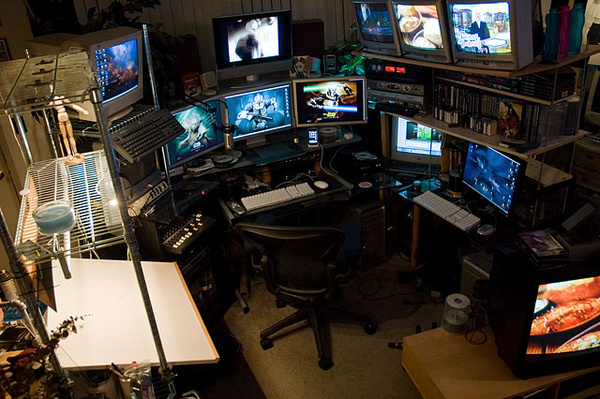
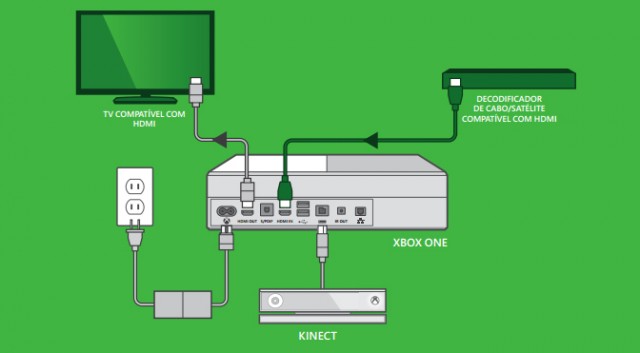
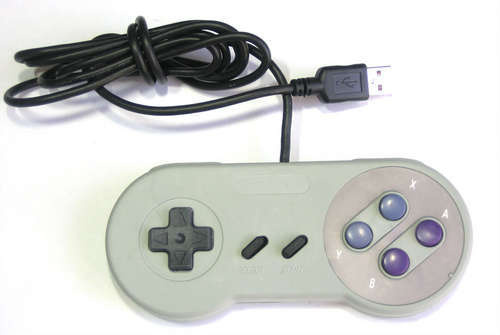

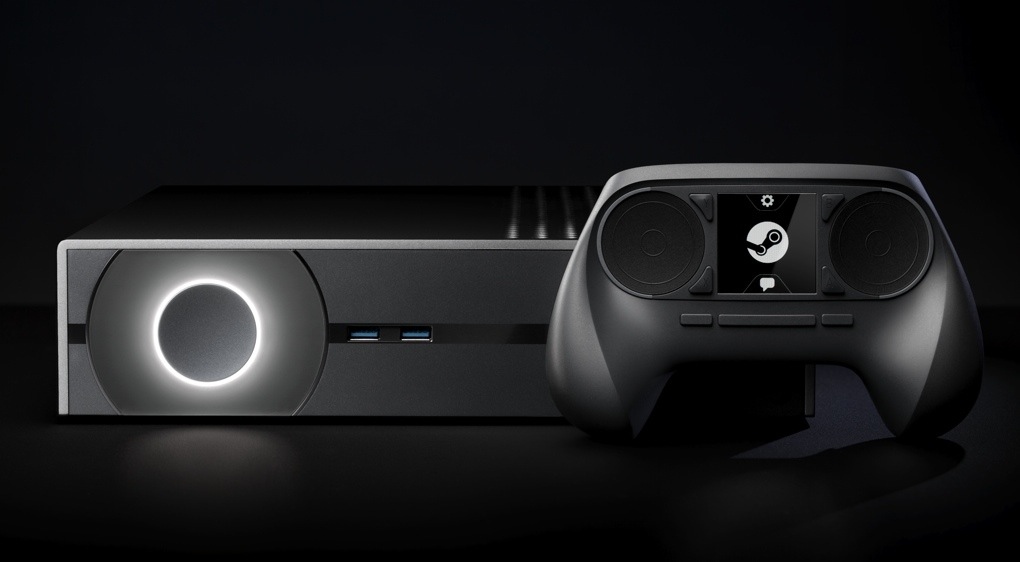
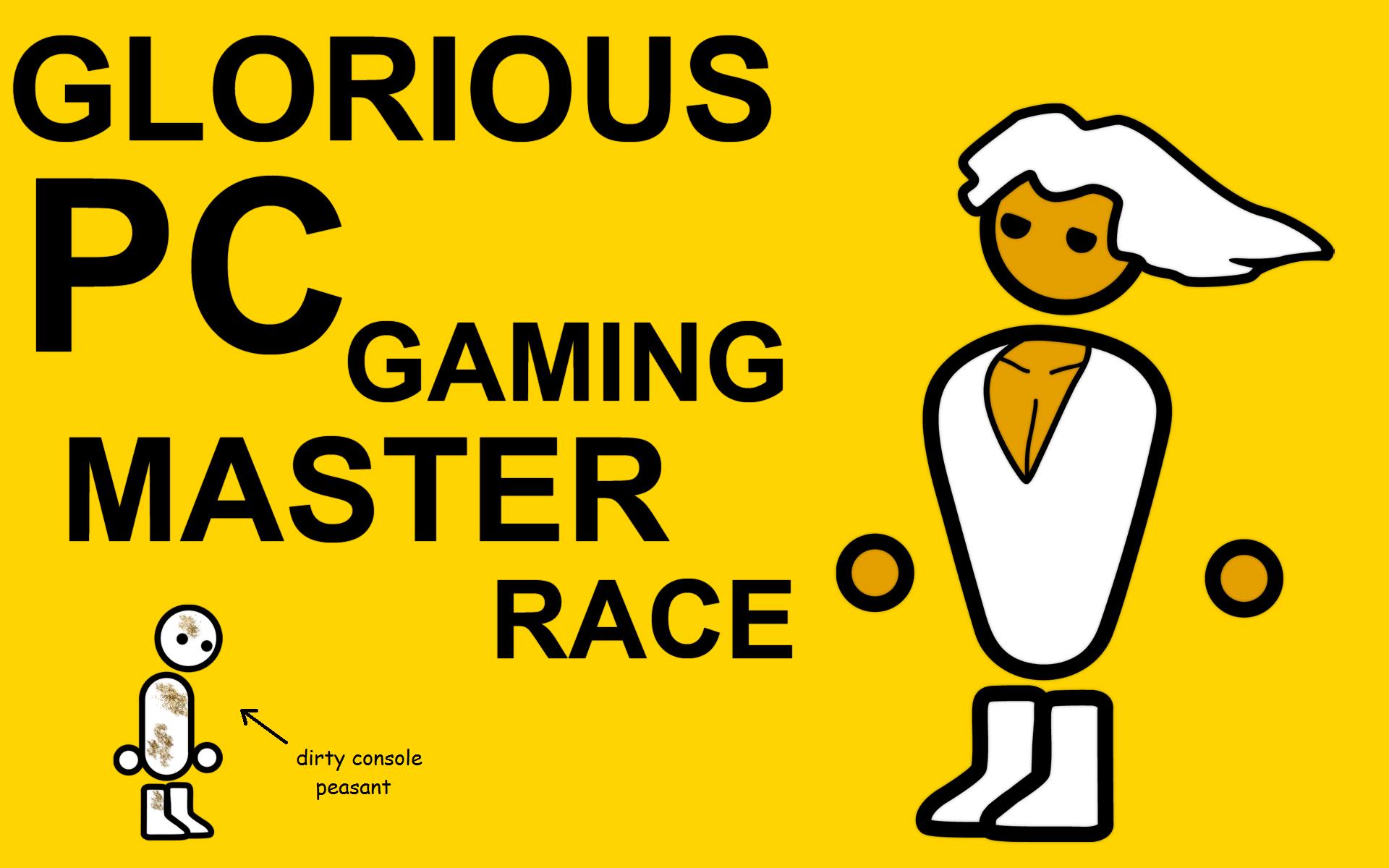
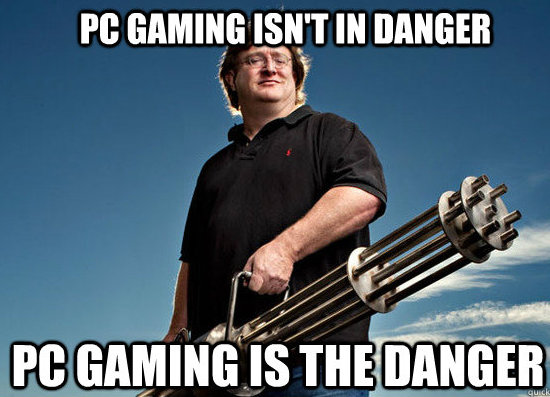
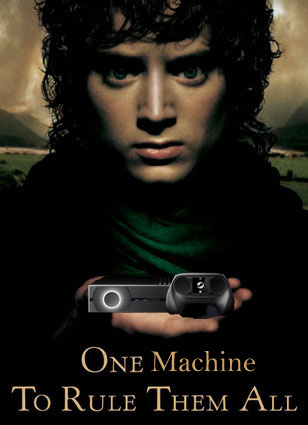
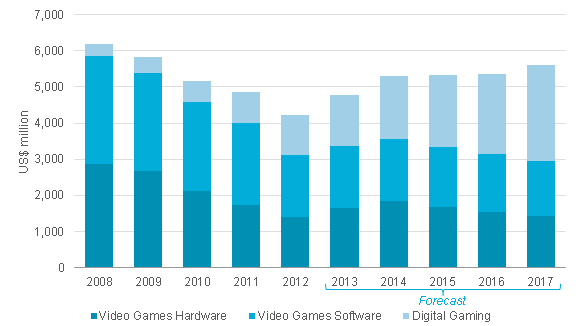

2 things: 1. Nintendo won´t leave consoles anytime soon. They gain way too much money by selling their own products.
2. Not everyone accepts digital release. Many prefer physical games. So a company that won´t produce physical games does not appeal to everyone. That´s why physical games will still be produced.